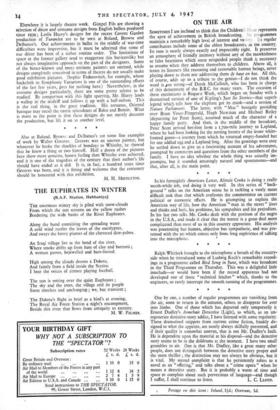ON THE AIR
SOMETIMES I am inclined to think that the Children's flour represents the apex of achievement in British broadcasting. Its programmes maintain a remarkably high level of interest and variety. Its regular contributors include some of the ablest broadcasters in the country. Its tone is nearly always exactly and impeccably right. It preserves an atmosphere of friendly intimacy without any of the mawkishness or false heartiness which some misguided people think it necessary to assume when they address themselves to children. Above all, it treats its listeners like reasoning and reasonable human beings, never playing down to them nor addressing them de haut en bas. All this, of course, adds up to a tribute to the genius—I do not think the word is loo strong—of Derek McCulloch, who has been in charge of this department of the B.B.C. for many years. The occasion of these encomiums is Request Week, which began on Sunday with a dramatised version of one of Kipling's lust So Stories—that superb legend which tells how the elephant got its trunk—and a session of Nature Parliament. The latter, with " Mac " benignly presiding over Brian Vesey-Fitzgerald, Hugh Newnan and Michael Batley (deputising for Peter Scott), assumed much of the character of a happy family party. And then, in the middle of the broadcast, Peter Scott arrived hot-foot from a 1,700-mile journey to Lapland, where he had been looking for the nesting haunts of the lesser white- fronted goose—a journey from which he returned empty-handed but for one addled egg and a Lapland frog. After the greetings were over he settled down to give us a fascinating account of his adventures, prompted by comments and questions from the other members of the family. I have no idea whether the whole thing was actually im- promptu, but it sounded amazingly natural and spontaneous—and that, after all, is the main point.
* * * *
In his fortnightly American Letter, Alistair Cooke is doing a really worth-while job, and doing it very well. In this series of " back- ground " talks on the American scene he is tackling a vastly, more difficult task than that which confronts the commentator on current political or economic affairs. He is attempting to explain the American way of life, how the American.'" man in the street" lives and thinks and feels, his problems, his sympathies and his prejudices. In his last two talks Mr. Cooke dealt with the position of the negro in the U.S.A., and made it clear that the matter is a great deal more complicated than most of us in this country appreciate. His analysis was penetrating but human, objective but sympathetic, and was pre- sented with the art which comes only from long experience of talking
into the microphone. • * * * *
Ralph Whitlock brought to the microphone a breath of the country- side when he introduced some of Ludwig Koch's remarkable record- ings in a programme called Bird Song in Tune, which was broadcast in the Third Programme on Thursday. This was a delightful little interlude—or would have been if the record apparatus had not developed one of those " technical hitches " which, thanks to the engineers, so rarely interrupt the smooth running of the programmes.
One by one, a number of regular programmes are vanishing from the air, some to return in the autumn, others to disappear for ever into limbo. One of those which has departed only temporarily is Ernest Dudley's Armchair Detective (Light), to which, as an un= regenerate detective-story addict, I have listened with some regularity. These dramatised snippets from current crime fiction, frankly de- signed to whet the appetite, are nearly always skilfully presented, and if their quality is somewhat uneven, that is not Mr. Dudley's fault. He is dependent upon the material at his disposal—and the detective story seems to be in the doldrums at the moment. I have two small grumbles to air. One is that Mr. Dudley, like a great many other people, does not distinguish between the detective story proper and the mere thriller ; the distinction may not always be obvious, but it is vital. My second complaint is that he persistently refers to a novel as an " offering," and talks about a " crime opera " when he means a detective story. But it is probably a waste of time and space to complain about such penrersions of language—and though






































 Previous page
Previous page